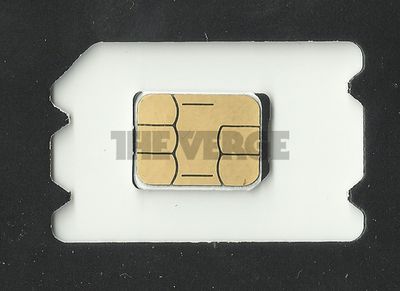Vote on Nano-SIM Standard Delayed Amid Continued Disagreements
Earlier this week, we noted that Apple had offered royalty-free licensing of its proposed design for next-generation "nano-SIM" cards for use in devices connecting to cellular networks, on the condition that its design be selected and that other rights holders offer similar licenses to encourage adoption.
 Prototype of Apple's proposed nano-SIM design inside outline of a mini-SIM card (Source: The Verge)
Prototype of Apple's proposed nano-SIM design inside outline of a mini-SIM card (Source: The Verge)But as
reported by FOSS Patents, the European Telecommunications Standards Institutes (ETSI) has postponed any vote on selecting a standard as the various companies proposing designs continue to squabble over the issue.
According to the report, the participating companies have failed to reach an agreement and decided not to hold the envisioned vote. In accordance with ETSI rules, the vote will now have to be postponed by a minimum of 30 days.
It appears that Nokia's overt unwillingness to license its potentially essential patents in the event that Apple's nano-SIM proposal is adopted and Sandisk's resistance to Nokia's proposal have resulted in an impasse. Sandisk, too, holds patents that may be essential to a new SIM card standard.
Apple is also coming under fire from the other participants in the negotiations, with Research in Motion accusing Apple of hiding its efforts to stack the voting panel by having at least three of its employees re-register for voting purposes as representatives of various carriers.
The RIM letter, which was submitted Wednesday, states that RIM over last few days has observed a number of people from one company changing their affiliation and registering to the meeting representing a completely different company. But voting by proxy during a technical body meeting is not allowed, according to RIM.
The letter highlights four examples, including three supposed Apple employees who have registered for Bell Mobility, KT Corp. and SK Telekom. Since voting by proxy isn't allowed, they should not be allowed to take part in the proceedings, according to RIM.
Apple's proposal is supported by most of the carriers, although it is unclear exactly what Apple's justification is for changing the registered affiliations of its representatives ahead of the previously-planned voting.
Popular Stories
Apple's next-generation iPhone 17 Pro and iPhone 17 Pro Max are less than three months away, and there are plenty of rumors about the devices.
Apple is expected to launch the iPhone 17, iPhone 17 Air, iPhone 17 Pro, and iPhone 17 Pro Max in September this year.
Below, we recap key changes rumored for the iPhone 17 Pro models:Aluminum frame: iPhone 17 Pro models are rumored to have an...
The long wait for an Apple Watch Ultra 3 appears to be nearly over, and it is rumored to feature both satellite connectivity and 5G support.
Apple Watch Ultra's existing Night Mode
In his latest Power On newsletter, Bloomberg's Mark Gurman said that the Apple Watch Ultra 3 is on track to launch this year with "significant" new features, including satellite connectivity, which would let you...
Apple is developing a MacBook with the A18 Pro chip, according to findings in backend code uncovered by MacRumors.
Earlier today, Apple analyst Ming-Chi Kuo reported that Apple is planning to launch a low-cost MacBook powered by an iPhone chip. The machine is expected to feature a 13-inch display, the A18 Pro chip, and color options that include silver, blue, pink, and yellow.
MacRumors...
The upcoming iPhone 17 Pro and iPhone 17 Pro Max are rumored to have a slightly different MagSafe magnet layout compared to existing iPhone models, and a leaked photo has offered a closer look at the supposed new design.
The leaker Majin Bu today shared a photo of alleged MagSafe magnet arrays for third-party iPhone 17 Pro cases. On existing iPhone models with MagSafe, the magnets form a...
Apple is planning to launch a low-cost MacBook powered by an iPhone chip, according to Apple analyst Ming-Chi Kuo.
In an article published on X, Kuo explained that the device will feature a 13-inch display and the A18 Pro chip, making it the first Mac powered by an iPhone chip. The A18 Pro chip debuted in the iPhone 16 Pro last year. To date, all Apple silicon Macs have contained M-series...
iOS 26 and iPadOS 26 add a smaller yet useful Wi-Fi feature to iPhones and iPads.
As spotted by Creative Strategies analyst Max Weinbach, sign-in details for captive Wi-Fi networks are now synced across iPhones and iPads running iOS 26 and iPadOS 26. For example, while Weinbach was staying at a Hilton hotel, his iPhone prompted him to fill in Wi-Fi details from his iPad that was already...
Apple today seeded the second betas of upcoming iOS 18.6 and iPadOS 18.6 updates to public beta testers, with the betas coming just a day after Apple provided the betas to developers. Apple has also released a second beta of macOS Sequoia 15.6.
Testers who have signed up for beta updates through Apple's beta site can download iOS 18.6 and iPadOS 18.6 from the Settings app on a compatible...
Apple hasn't updated the AirPods Pro since 2022, and the earbuds are due for a refresh. We're counting on a new model this year, and we've seen several hints of new AirPods tucked away in Apple's code. Rumors suggest that Apple has some exciting new features planned that will make it worthwhile to upgrade to the latest model.
Subscribe to the MacRumors YouTube channel for more videos.
Heal...
As part of its 10-year celebrations of Apple Music, Apple today released an all-new personalized playlist that collates your entire listening history.
The playlist, called "Replay All Time," expands on Apple Music's existing Replay features. Previously, users could only see their top songs for each individual calendar year that they've been subscribed to Apple Music, but now, Replay All...























